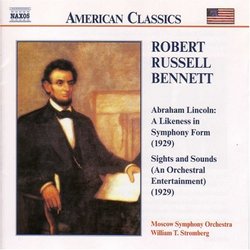| All Artists: Robert [1] Russell Bennett, William T. Stromberg, Moscow State Symphony Orchestra Title: Robert Russell Bennett: Lincoln: Likeness in Symphony Members Wishing: 0 Total Copies: 0 Label: Naxos American Release Date: 7/20/1999 Genre: Classical Style: Symphonies Number of Discs: 1 SwapaCD Credits: 1 UPC: 636943900420 |
Search - Robert [1] Russell Bennett, William T. Stromberg, Moscow State Symphony Orchestra :: Robert Russell Bennett: Lincoln: Likeness in Symphony
 | Robert [1] Russell Bennett, William T. Stromberg, Moscow State Symphony Orchestra Robert Russell Bennett: Lincoln: Likeness in Symphony Genre: Classical
|
Larger Image |
CD Details |
CD ReviewsFascinating -- and strange Gene DeSantis | Philadelphia, PA United States | 01/15/2006 (5 out of 5 stars) "Ah, the paradox of Robert Russell Bennett: he made great art, but not the great art he wanted to make. He wrote "nearly 200 original works -- symphonies, operas, chamber music, choral and vocal music, and more than two dozen pieces for wind band," practically all groaning under a heavy accumulation of dust in libraries and archives. Meantime he orchestrated over 300 musicals, and while many of them languish forgotten or lost some do not, certainly not "Show Boat"; Bennett's majestic Overture set the tone for a masterpiece and the standard for Broadway overtures until Leonard Bernstein's "Candide" came along. His outstanding arrangements brim with inspiration and taste. So Bennett did all this "hack work" (he thought), but we're lucky he did -- and so is he, otherwise he might not merit a paragraph in "Grove's." Bennett (George J. Ferencz' booklet notes tell us) wrote these two works in 1929 for a contest sponsored by Victor Talking Machine, and they both won cash awards and first-recording rights, which tellingly neither Victor nor its successor RCA ever exercised. The Lincoln work appears not to have been publicly performed since two outings with Stokowski and the Philadelphia in late 1931 (we must infer this as Naxos got the score and parts out of the city's Free Library). Perhaps it's unfair to contrast it to the Lincoln Portrait of 1942, but one must: if Copland too easily resorts to bombast and folk tunes, there is no denying it a stirring tribute to a great man. Without the program you can't tell what the Likeness is about. Bennett brings in trombones and faux minstrel music to indicate Lincoln's humor, and a brassy screech and glissando to indicate John Wilkes Booth, but it doesn't have the guts to be memorable; it's a well-crafted, highly-polished, eminently respectable piece of concert stuffing. The Sights and Sounds, not performed until 1938 at a WPA-financed affair in Illinois, is somewhat more successful, as it isn't weighted down with the Likeness's significance. The movement titles ("Union Station," "Highbrows," "Lowbrows") suggest an urban symphony and fun, perhaps some backhanded quoting from his Broadway work; alas, Bennett takes himself quite seriously. He does produce a jolt of electricity in "Electric Signs", and "Fox Trot" produces a jolt of its own with its vague resemblance to "Independent" from Jule Styne's "Bells are Ringing" (another of Bennett's arranging "hack works"), and in good period manner he summons wa-wa mutes for "verisimilitude" (and the strange device of numbering the movements with a xylophone counting out the numbers). "Adagio religioso" may seem an odd tempo marking for a movement called "Skyscraper," but you can almost see the Chrysler Building's spire emerge from within its shell as it neared completion. Unfortunately, four years earlier Gershwin had the same intentions with his Concerto in F and produced a masterpiece of Art Deco music that made this one quite expendable. If these works are typical Bennett's ambitions soared well above his talent. Without a gift for melody he can only approximate music; he needed the guiding hand of inferiors like Kern and Rodgers to create real beauty. Despite these slighting comments I give this album five stars to recognize Bennett's noble aspirations, and as these are quite fascinating works whatever their faults, and also as William Stromberg boldly leads the Moscow Symphony in these well-engineered recordings." Enriching David Saemann | 01/09/2008 (5 out of 5 stars) "Thinking of Bennett as a Broadway show orchestrator, I was unprepared for how good this CD is. The Abraham Lincoln symphony succeeds handsomely, even without reference to its programmatic content. It is well made, interestingly scored, and builds to a handsome conclusion. Sights and Sounds is more forward looking. I sense the influence of Gershwin in the angularity of the music, without any of George's great big tunes. Instead, Bennett gives us a highly textured look at city scenes, vividly recreating the cultural panorama of his times. It's a shame all this music was overlooked for so long. William T. Stromberg is an excellent conductor (His Grand Canyon Suite is comparable to Bernstein's, Ormandy's, and Fiedler's.). The sound quality of the CD is quite good, and there is nothing to hinder you from enjoying some innovative music making." Near Greatness from an Unexpected Source minacciosa | Boston, MA | 09/05/2007 (4 out of 5 stars) "Everybody knows Robert Russell Bennett, right? Broadway, movie arrangements, a few original works, a violin concerto, etc. So thought I until I heard Sights and Sounds. It's a work of extraordinarily high quality and inventiveness. I first heard it cold, coming into a radio broadcast just seconds after it began. I had no idea what was being played but it was riveting. My surprise was complete when its composer was announced. I've since heard it again and my initial impressions were confirmed. Sights and Sounds is a fantastic achievement, and based upon that assessment, I'd say it's incumbent upon us to examine in detail Bennett's large legacy of original compositions. He was no journeyman, but a true creator, a real composer.
I have not heard the Lincoln symphony yet." |

 Track Listings (11) - Disc #1
Track Listings (11) - Disc #1